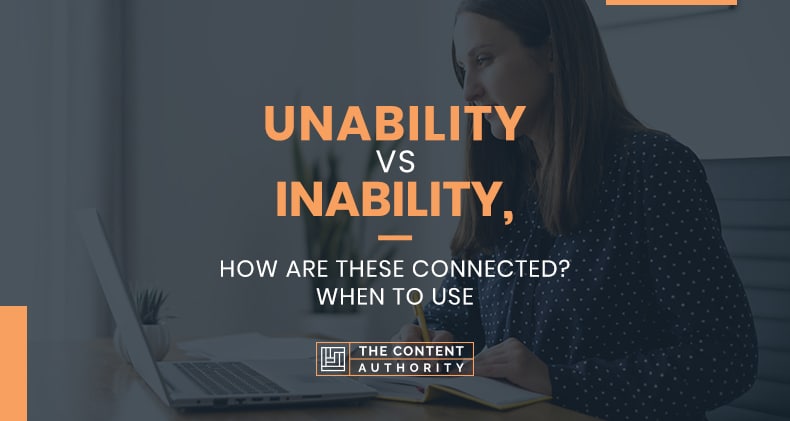Have you read books with one of these words? It is possible that you have figured out the meaning of them based on the context of the reading. These are two words that you use to refer to the inability to do something.
The relation between “unability” and “inability” is that both words mean the same. “Inability” is the quality of being incapable; lack of ability; lack of sufficient power, strength, or capacity. “Unability” is a synonym for inability; the only difference is that it is a word that has become obsolete.
It is usual for these words to cause confusion due to the similarity in spelling and meaning. Some people may think that one of them is incorrect. The truth is that they are both correct. Nowadays, inability is the word that everyone uses since “unability” has become an obsolete term.
What Exactly Is Inability? And What Is Unability?
Inability expresses the incapacity of a person to do something, to carry out a task due to incompetence. “Unability” is the ancient form that refers to the failure to complete an action, not necessarily by choice. But in both cases, it is the inability to perform a task.
The Origin Of These Words

Getting a single source that refers to the exact origin of these words is quite difficult. As in many cases, the actual basis of their use and adoption by society is quite ambiguous.
Some clues serve to speculate on the purpose of their first use or how these words were created. Still, these references are open to the interpretation of each person. The only certainty is that we will describe some of these theories to know a little more about the roots of our language.
- There are old books that indicate that “un” is used with words of German origin, while “in” is used with terms that come from Latin. Experts say that “unability” was used until the 18th century.
- For several centuries the English language used both “inability” and “unability.” Still, in the middle of the 18th century, “unability” was removed from people’s vocabulary without any explanation.
- The “a,” “un,” and “in” share the same root in “a / an.” They are present in Sanskrit. They all mean “not.” Although “a” tends to precede words of Greek origin, while “in” tends to precede words of Latin origin, and “un” precedes terms of German origin. However, this should not be taken as a definitive rule.
- If we quickly review the origin of the word “inability,” we will see that it was initially written as “unability.” Nevertheless, it seems that its spelling did not change until it became more similar to Latin.
Origins According To The Oxford English Dictionary
The Oxford English Dictionary (OED) explains that from the 14th century onwards, a significant change took place concerning word usage. There are examples of words with “un,” which later changed to “in.” For instance, some words originally carried “un”:
- Un-ability
- Un-corrigible
- Un-corrupt
- Un-curable
- Un-discreet
- Un-measurable
- Un-movable
- Un-numerable
- Un-perfect
- Un-perfection
- Un-portable
- Un-possible
The high point of double words with “in” and “un” was in the 17th century. Since this period, the tendency has been to eliminate some of the double words. There is a preference for terms beginning with “in” when the word has a Latin origin. That is the case of inability, inadequate, inadvertence, or inarticulate. However, today there are still many double words in use.
How Do People Use The Word Inability?

As we have seen so far, “inability” is a word that has been very present in our lives for quite some time. We know its primary meaning is related to the inability of a person to do something. Still, we also find that people have given it other interesting purposes when using this popular word. Here are some of its uses.
- When referring to a failure, it is a way of indicating lack of success. In other words, a negative outcome was achieved.
- When referring to inefficiency, it is used to say that someone could not achieve a crucial goal.
- When pointing out an error, it is describing that someone made a mistake.
- When expressing impotence, it means lacking the drive or strength to complete a task.
- When describing incompetence, it is used to acknowledge someone’s inability to resolve a situation effectively.
- When talking about someone’s ineptitude, we use this word to say that someone does not have the necessary aptitude to complete an action. It is the lack of ability to do things.
- In order to describe the absence of something, it is used to say that a person lacks “something” essential to be successful.
- When discussing someone’s weakness, it is used to say that a person lacks decisiveness, courage, and character to solve problems.
- When referring to a deficiency, It is a way of talking about people’s flaws and imperfections.
- When trying to convey that someone lacks experience, we use this word to indicate that a person will be unable to achieve a goal due to his lack of knowledge in a specific area.
- When pointing out a careless person, it is used to describe people’s inability to perform tasks because they are irresponsible or unintelligent.
- When referring to someone as clumsy, use this word to describe someone incompetent, mentally slow, and unskillful in their behavior.
Examples Of The Use Of The Word Inability In Everyday Sentences
It is time to review several practical examples of this word. This practice always helps us to better understand how we can create actual sentences in our daily lives.
Sometimes it is not enough to know the words and understand them, to be able to use them. It all depends on which learning method is best suited to each person. It is essential to see concrete examples of using words to transfer those experiences to our own realities. That will help us get all these new concepts engraved in our minds. Let’s see some examples of inability.
- His inability to speak in public has made him very insecure.
- She has demonstrated her inability to learn another language.
- Peter confessed his inability to solve this problem.
- The Smith family reported his inability to raise the money for the mortgage.
- Her inability to pay the bank on time was a terrible mistake.
A Final Look At The Words “Inability” And “Unability”

These double words can be a bit confusing. We hope that after this reading, we have been able to clear up some of your doubts; the critical thing to remember is that:
- Both words have the same meaning.
- Inability is the word that is most used nowadays.
- “Unability” is a word that has been in disuse since the 18th century. Even if you use it in written work, most spelling software will likely mark it as an error.
- The word “inability” can have many variations of meaning, depending on the connotation you want to assign to it. Almost all of these variations have a negative implication.
After this extensive review, we invite you to use it more often in situations where it is appropriate and observe people’s reactions to it. This is an exercise that is both fun and effective at the same time. The world of knowledge requires curiosity, interest, dedication, and a lot of practice.
Shawn Manaher is the founder and CEO of The Content Authority. He’s one part content manager, one part writing ninja organizer, and two parts leader of top content creators. You don’t even want to know what he calls pancakes.

